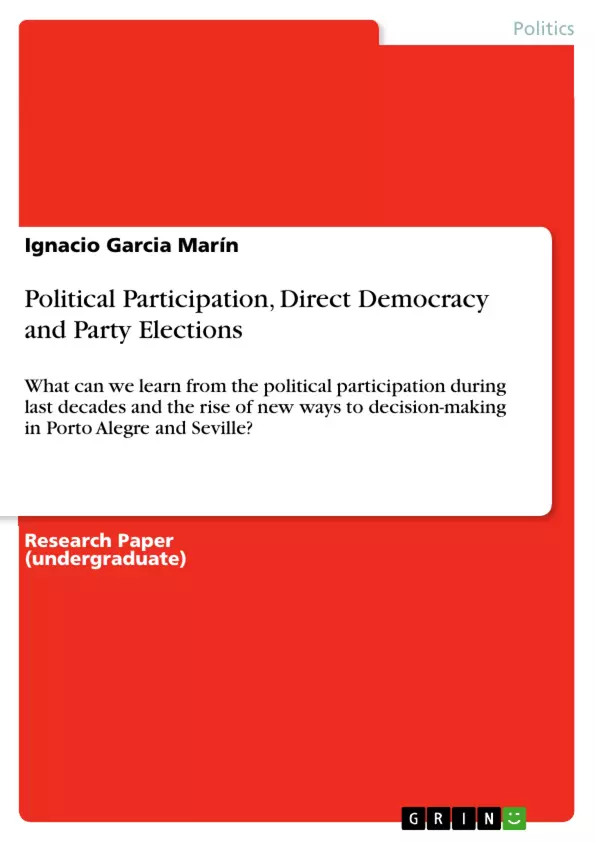In this paper I am going to describe the fall of conventional political participation within
western European countries. Later on I am going to defend some possible ways to fix it and
finally, I will expose my proposal: promotion of direct democracy through the Participatory
Budgeting. With the cases of Porto Alegre and Seville, -with different situations and
challenges- the values of transparency, participation, deliberation and responsiveness
become especially protagonist. Politicians often think that people do not have any interest for
the political arena. In fact, rarely they make decisions to try to attract citizens to institutions.
Like the current Prime Minister of the United Kingdom, David Cameron, they blame external
factors to explain why citizenship refuses in part their representatives 1. The separation
between citizen's demands and politician's rules could be a possible answer to the tragic riots
during last weeks in England. Similarly, the reason for the Spanish Revolution that “pushed”
during May and June millions of citizens of varied social groups into the streets is not only the
tremendous unemployment rate. We cannot understand any social behavior if we exclude the
political variable. Both David Cameron as Zapatero have decided strong economic cuts -
hard to understand for citizens - while the voice of millions of Europeans against these
decisions were expressed roundly. The sensation of politicians deaf respect citizens and the
increasing idea that they do not solve anything is frequent.
At the same time, social movements, demonstrations and claims thrive, creating a
democracy with varied and multiple channels where ideas are expressed. Citizens are
interested in politics, but the current representative system is marked by slowness and rigidity
of the new times. Literature shows us how voter turnout and affiliations to political parties drop
dramatically until today, with alarming rates of disaffection, skepticism and distrust to political
institutions. People do not find solutions and support from parties, and the divorce is a fact.
However, our societies are mature and prepared for more protagonism in decision-making.
We should decide more times than once every four years. We want and we need. We have to
walk to a new model of democracy. Then, how are the principal Participatory Budgeting's
experiences? What can we learn from them?
Inhaltsverzeichnis (Table of Contents)
- Introduction
- From a representative and distant democracy to a broad, plural and skeptical political arena.
- The Participatory Budgeting experience, a short outlook
- Porto Alegre: pioneer and model to follow
- Seville: challenge and reference in Europe.
- What can we learn from these experiences?
- Conclusions
Zielsetzung und Themenschwerpunkte (Objectives and Key Themes)
This paper examines the decline of conventional political participation in Western European countries and argues for the promotion of direct democracy through Participatory Budgeting (PB) as a potential solution. The paper uses the examples of Porto Alegre and Seville, showcasing the values of transparency, participation, deliberation, and responsiveness through different situations and challenges.- The decline of traditional political participation in Western Europe
- The rise of direct democracy and Participatory Budgeting
- The role of transparency, participation, deliberation, and responsiveness in democratic processes
- The case studies of Porto Alegre and Seville as examples of Participatory Budgeting
- The potential of Participatory Budgeting to revitalize democracy
Zusammenfassung der Kapitel (Chapter Summaries)
- Introduction: This chapter introduces the topic of declining political participation in Western Europe and outlines the paper's argument for promoting direct democracy through Participatory Budgeting. It highlights the disconnect between citizens' demands and politicians' actions, illustrated by recent events in England and Spain.
- From a representative and distant democracy to a broad, plural and skeptical political arena: This chapter explores the reasons behind the decline of traditional political participation. It examines trends such as declining voter turnout, the rise of new political movements, and the changing role of political parties. The chapter cites literature that supports the observation of decreasing participation rates in developed democracies and explores the factors contributing to this shift, including the impact of the 1973 oil crisis and the evolution of mass media.
- The Participatory Budgeting experience, a short outlook: This chapter introduces the concept of Participatory Budgeting and examines its implementation in Porto Alegre and Seville. The chapter explores the unique challenges and successes of each city, emphasizing the positive impact of Participatory Budgeting on transparency, citizen engagement, and democratic decision-making.
Schlüsselwörter (Keywords)
The paper focuses on the crucial topics of political participation, direct democracy, participatory budgeting, citizen engagement, transparency, deliberation, and responsiveness. It examines these themes through the lens of specific case studies, namely Porto Alegre and Seville. The paper emphasizes the importance of understanding the evolving nature of democracy in the face of declining traditional political participation and proposes participatory budgeting as a potential solution to revitalize democratic processes.Frequently Asked Questions
What is the primary argument of this paper regarding political participation?
The paper argues that conventional political participation is declining and proposes direct democracy through Participatory Budgeting as a solution.
What is Participatory Budgeting (PB)?
It is a democratic process in which community members decide how to spend part of a public budget, promoting transparency and engagement.
Which cities are used as case studies for Participatory Budgeting?
The paper examines Porto Alegre in Brazil, known as a pioneer, and Seville in Spain as a European reference.
Why is traditional representative democracy facing skepticism?
Reasons include the perceived distance between politicians and citizens, declining voter turnout, and the rigidity of current political systems.
What can be learned from the experiences in Porto Alegre and Seville?
These cases show that direct involvement in decision-making can revitalize democracy and improve responsiveness to citizen demands.
- Quote paper
- Licenciado Ignacio Garcia Marín (Author), 2011, Political Participation, Direct Democracy and Party Elections , Munich, GRIN Verlag, https://www.grin.com/document/180800



